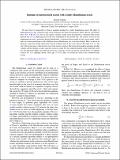Runtime of unstructured search with a faulty Hamiltonian oracle
Author(s)
Temme, Kristan
DownloadPhysRevA.90.022310.pdf (86.44Kb)
PUBLISHER_POLICY
Publisher Policy
Article is made available in accordance with the publisher's policy and may be subject to US copyright law. Please refer to the publisher's site for terms of use.
Terms of use
Metadata
Show full item recordAbstract
We show that it is impossible to obtain a quantum speedup for a faulty Hamiltonian oracle. The effect of dephasing noise to this continuous-time oracle model has first been investigated by Shenvi, Brown, and Whaley [Phys. Rev. A 68, 052313 (2003).]. The authors consider a faulty oracle described by a continuous-time master equation that acts as dephasing noise in the basis determined by the marked item. The analysis focuses on the implementation with a particular driving Hamiltonian. A universal lower bound for this oracle model, which rules out a better performance with a different driving Hamiltonian, has so far been lacking. Here, we derive an adversary-type lower bound which shows that the evolution time T has to be at least in the order of N, i.e., the size of the search space, when the error rate of the oracle is constant. This means that quadratic quantum speedup vanishes and the runtime assumes again the classical scaling. For the standard quantum oracle model this result was first proven by Regev and Schiff [in Automata, Languages and Programming, Lecture Notes in Computer Science Vol. 5125 (Springer, Berlin, 2008), pp. 773–781]. Here, we extend this result to the continuous-time setting.
Date issued
2014-08Department
Massachusetts Institute of Technology. Center for Theoretical PhysicsJournal
Physical Review A
Publisher
American Physical Society
Citation
Temme, Kristan. “Runtime of Unstructured Search with a Faulty Hamiltonian Oracle.” Phys. Rev. A 90, no. 2 (August 2014). © 2014 American Physical Society.
Version: Final published version
ISSN
1050-2947
1094-1622